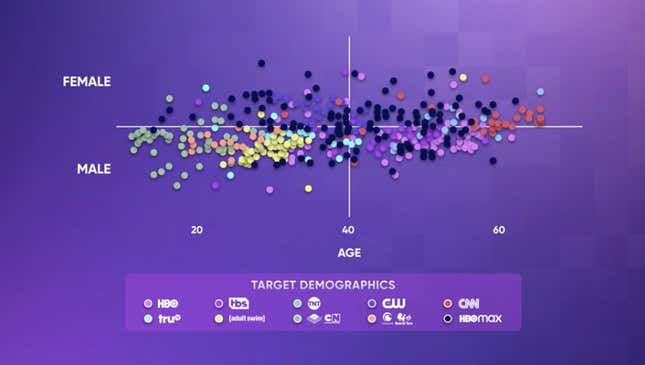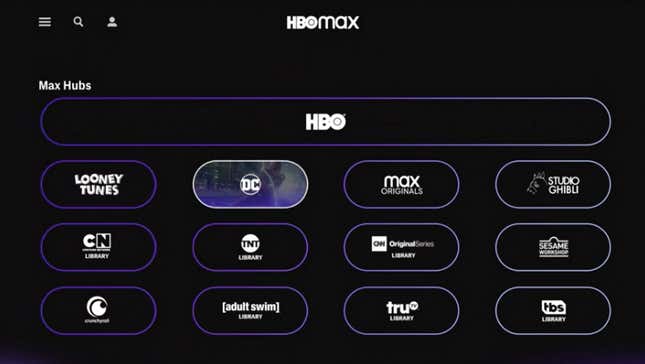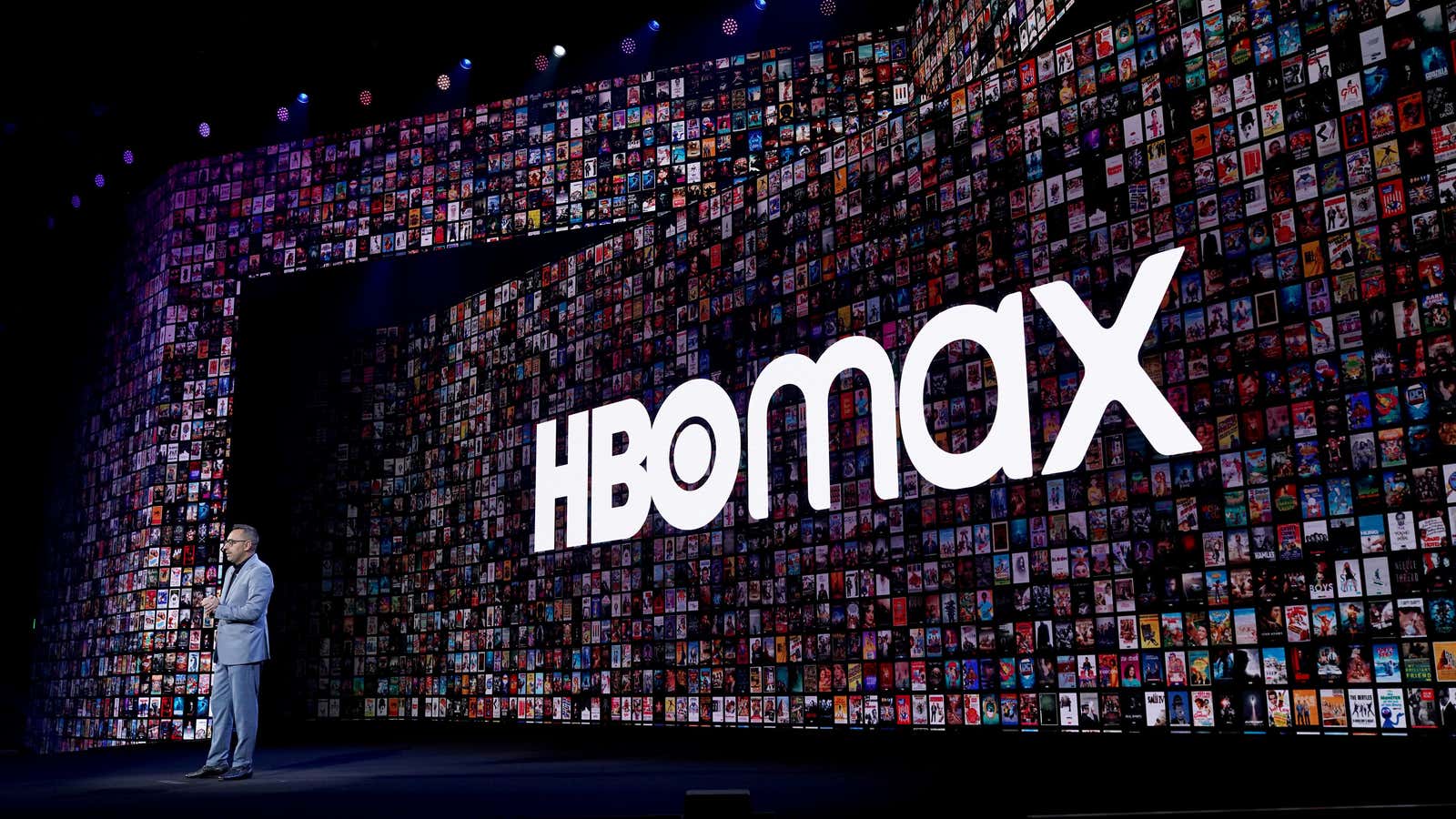The HBO you’re used to could soon be a thing of the past.
HBO’s parent, WarnerMedia, now owned by AT&T, officially unveiled its upcoming streaming service, HBO Max, to investors and media members at an event on the Warner Bros. lot in Los Angeles yesterday (Oct. 29). For $15 per month, subscribers will get all of HBO plus new originals shows and thousands of hours of library content from across WarnerMedia’s other brands, such as TNT, TBS, and CNN. HBO Max will be available in the United States in May, while international versions are expected to roll out in 2021.
Analysts predicted HBO Max would cost in the $16-20 range, since HBO already costs $15 on its own, and HBO Max will include a lot more stuff. But the announcement that HBO Max will cost exactly the same as HBO means only one thing for the legacy pay-cable channel: Its days are numbered.

Yesterday’s presentation made it clear HBO Max is WarnerMedia’s most important product. Everything else—including and especially HBO—is in service of that. For decades, HBO was Warner’s flagship television brand. Now, it’s an ancillary component whose brand identity will likely diminish over the coming years as subscribers desert the HBO cable channel for HBO Max.
Why would anyone subscribe to normal HBO when you can get all that and much more for the same price with HBO Max?
In order to be an entertainment leader in the future and compete with the likes of Netflix and Disney, which is unveiling its own streaming service next month, AT&T believes it needs all of its properties working in unison to boost the HBO Max offering. While that should strengthen the product, it will, inevitably, dilute the brand that made HBO unique. (Not to mention consumers are already confused by the various HBO-branded products within the WarnerMedia universe, which now almost seems intentional, as the company hopes everyone in its ecosystem eventually becomes HBO Max subscribers.)
HBO shows will live on HBO Max alongside content from other brands that may not live up to the channel’s quality or share its particular aesthetic. HBO Max will also include “Max Originals”—series made exclusively for the service but are separate from the HBO brand. It’s unclear how WarnerMedia will differentiate between what’s an HBO show and what’s a Max Original moving forward. Many of the shows announced as Max Originals, like a sci-fi series from director Ridley Scott and a post-apocalyptic drama directed by Hiro Murai (who’s already worked with HBO on Barry), seem like they could just as easily be HBO series—and perhaps may have been in the past.
WarnerMedia executives are at least publicly suggesting they still care about protecting HBO’s identity. They mentioned “curation” more than once during the presentation. And, for what it’s worth, the HBO button on the HBO Max interface is considerably larger than those of WarnerMedia’s other channels:

But the writing’s been on the wall ever since AT&T bought WarnerMedia and mandated HBO and its other networks get bigger and do more to compete for the future of TV. A number of longtime HBO executives left the company shortly after it was purchased, including CEO Richard Plepler, PR chief Nancy Lesser, and the head of miniseries and Cinemax programming, Kary Antholis.
Last year, HBO programming president Casey Bloys (who has remained with the company) said there’s no plan to dilute the brand in favor of volume programming. “No one has come to us and asked us to not do what we do, which is curate excellence,” he said.
And that may be true. AT&T may continue to give HBO autonomy to make what it wants, how it wants to (even if it wants the channel to make a lot more of whatever that is). But the brand can still be diluted even without any corporate interference into the way it operates day to day. The very concept of “HBO,” as its own entity, won’t survive the transition to HBO Max for long.
This might be good for consumers in the short term (the price is, undeniably, great value), but looking beyond the next few years, if HBO’s reputation suffers, it could struggle to continue attracting the top talent it’s accustomed to amid a sea of other streaming competitors with pockets just as deep. If the quality of HBO content diminishes, then suddenly HBO Max, at $15 a month, doesn’t seem like such a great deal.
Here’s what else we learned about HBO Max from the presentation yesterday:
Shared profiles
HBO Max will allow family members to “co-view” shows and create a joint profile. The service will then recommend other content based on your joint viewing, without messing with the individual preferences of each person.
Recommended by humans
Rather than rely on algorithms, HBO Max will include a “Recommended by Humans” feature that is pretty much exactly what it sounds. Real humans, including famous actors like Zac Efron, will recommend things on the service that they enjoyed. It will also include human-curated show and episode lists for users looking for things that are similar to other things they’ve liked.
The death of binge-watching?
Episodes of original series on HBO Max, like on regular HBO, will be released weekly, not all at once. Disney+ shows will also be released weekly, as will a selection of Apple TV+ shows. Companies are clearly valuing the cultural conversations that happen in the space between episodes, which Netflix-style binge releases don’t permit. While a Netflix show might be in the news for a week or two after it releases, an HBO show is often a hot water-cooler topic for months while it’s on the air.
HBO Max got South Park
WarnerMedia announced it secured the exclusive streaming rights to all seasons of the animated comedy series South Park. The company reportedly paid $500 million for those rights, according to Bloomberg. South Park joins Friends and The Big Bang Theory as popular comedies WarnerMedia purchased for the HBO Max library.
WarnerMedia isn’t too concerned about password sharing
COO John Stankey told the audience that the company does not intend to be “punitive” toward those who share their HBO Max logins with friends and families except in instances of “extensive abuse.” That’s in line with Netflix, which has historically been lax in enforcing its login limits, believing the consumer-friendly position helps with marketing and brand awareness. Stankey did add that as technology improves, it will become easier for the company to pinpoint the people abusing the system and prevent them from doing so in the future.
More Game of Thrones is coming
Bloys announced that HBO has ordered a Game of Thrones prequel straight to series (meaning the channel is committed to the whole season getting made, not just a pilot episode). Based on George R.R. Martin’s book Fire and Blood, it will be called House of the Dragon and follow the exploits of the Targaryen dynasty 300 years before the events of Game of Thrones. Earlier that day, HBO reportedly halted development on a separate prequel series—so it’s only moving forward with one. For now.
